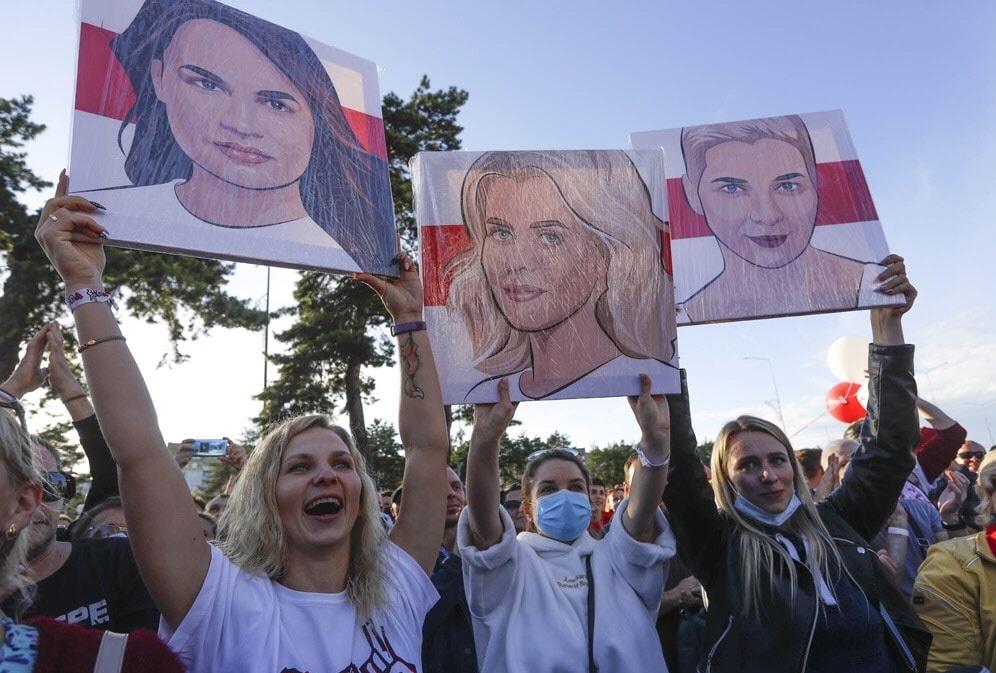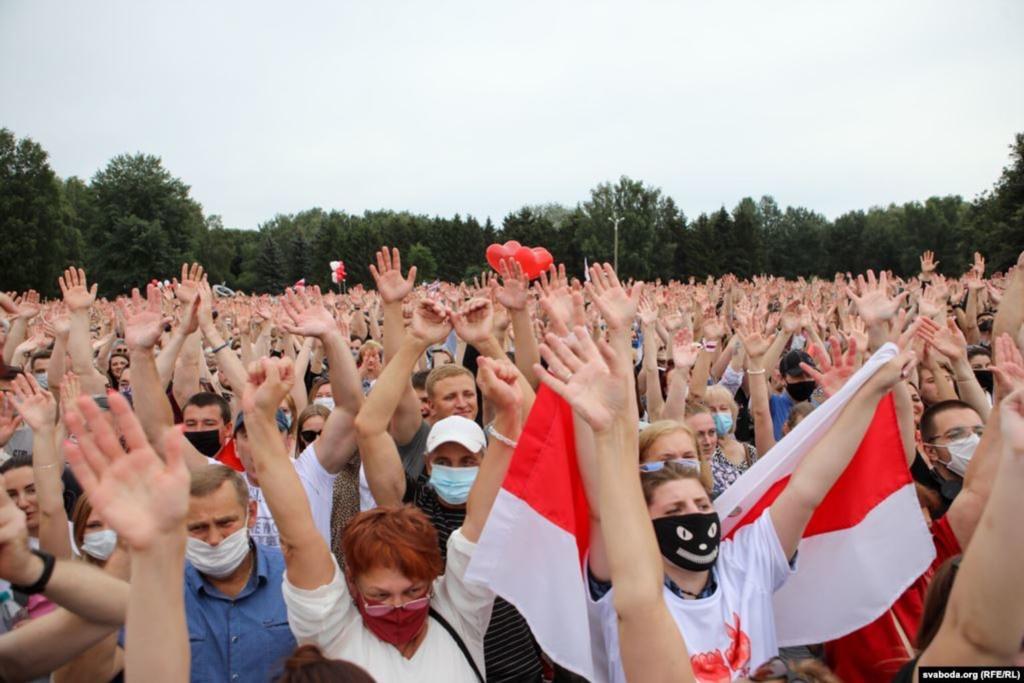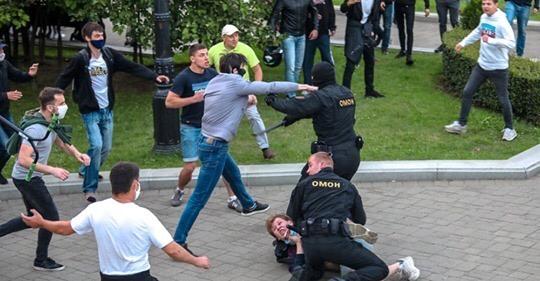Por Jan Kryshkevich
El 9 de agosto en Bielorrusia deben celebrarse las elecciones presidenciales. Las elecciones no son más que un teatro: durante 26 años, el presidente Lukashenka se ha elegido a sí mismo, repitiendo este ritual sagrado cada cinco años.
No podemos decir que el pueblo bielorruso todos estos años soporta silenciosa y mansamente esa burla de la Constitución y sus derechos electorales. La última manifestación importante de los que no estaban de acuerdo con los resultados oficiales de la votación tuvo lugar en 2010, cuando más de 60.000 personas salieron a las calles de Minsk. Entonces, la protesta pacífica fue brutalmente reprimida por las fuerzas antidisturbios del Ministerio del Interior, y 7 ex candidatos a presidente fueron arrestados y metidos a la prisión de la KGB. Después del arrepentimiento público, los prisioneros fueron liberados, a excepción de Mikalay Statkevich (líder del Partido Socialdemócrata «Hramada»), quien se negó a admitir su culpa en la organización de los disturbios y fue sentenciado a 6 años en una prisión de máxima seguridad.
Las mujeres bielorrusas han encabezado la lucha contra el régimen de Lukashenka

La campaña electoral actual se diferencia cualitativamente de todas las
anteriores. Muy inesperadamente, además de los tradicionales spoilers
seudoopositores de Lukashenka, surgieron nuevas personas que encabezaron la
carrera presidencial: el popular bloguero del canal de Telegram «País para
vivir» Siarhey Tsikhanouski, el gerente del banco Belgazprombank Viktar
Babaryka y el diplomático, ejecutivo estatal y el fundador del Parque de Altas
Tecnologías en Bielorrusia Valery Tsapkala.
El apoyo que obtuvieron estos tres les conmocionó a las autoridades. Por
ejemplo, sólo en el grupo de iniciativa de Viktar Babaryka más de 10.000
personas entraron durante una sola semana. Prácticamente en todas las ciudades
de Bielorrusia, la gente formó enormes colas para dar sus firmas para que se
nominen estos tres candidatos. La recolección de firmas se convirtió
espontáneamente en manifestaciones multitudinarias durante una de las cuales
Siarhey Tsikhanouski fue arrestado. Ahora le han presentado las acusaciones de
organización de alborotos y obstrucción del funcionamiento de la Comisión
Electoral Central (CEC). Siarhey Tsikhanouski ya desde hace dos meses está
encarcelado en el centro de prisión preventiva y corre con el riesgo de sacar
hasta 10 años de prisión. Inmediatamente
después del arresto de Tsikhanouski, Svyatlana Tsikhanouskaya, su esposa,
presentó su candidatura en su lugar y recolectó rápidamente el número requerido
de firmas.
La siguiente víctima del régimen fue Viktar Babaryka, acusado de fraude
financiero, aunque antes, durante 20 años, el Estado no tuvo reclamaciones
algunas en lo que concernía a sus actividades bancarias. Junto con Viktar
Babaryka, fue arrestado su hijo, Eduard, un poco más tarde, los amigos de la
familia y los empleados del banco.
Luego, Lukashenka fue tras Valery Tsapkala quien fue
acusado de corrupto y sobornado. Valery Tsapkala que tuvo que firmar el
compromiso de no abandonar el país acaba de huir a Rusia junto con sus hijos.
La Comisión Electoral Central (CEC) también se negó a registrar a los tres
candidatos como participantes de las elecciones bajo pretextos inventados:
firmas inexactas y financiamiento de la campaña electoral por parte de un
Estado extranjero.
No obstante, Svyatlana Tsikhanouskaya fue registrada como candidata a la
presidencia. Aparentemente, las autoridades la consideraron una rival débil,
encima que su esposo está en prisión, de hecho, es un rehén.
A Svyatlana Tsikhanouskaya la decidieron apoyar como
candidata a la presidencia el equipo de Viktar Babaryka representado por su
jefa Maryya Kalesnikava, y el equipo de Valery Tsapkala representado por la
coordinadora del equipo, su esposa, Viktoryya Tsapkala.
De este modo, la lucha contra el régimen de Lukashenka es liderada por tres
mujeres bielorrusas que hoy gozan de un enorme apoyo popular.
La resistencia no se detiene: la palabra la tienen que tomar los trabajadores

Los arrestos de los verdaderos opositores de Lukashenka han provocado las masivas protestas pacíficas en Bielorrusia que han sido brutalmente dispersadas por las fuerzas especiales de la policía. Cabe destacar que las protestas surgen no sólo en la capital y en los centros regionales, sino prácticamente en todas las ciudades grandes del país. La Bielorrusia bajo Lukashenka nunca supo un auge territorialmente tan grande. Miles de detenidos y condenados, unas multas enormes, los arrestos administrativos e iniciación de casos penales: el gobierno utiliza todo el arsenal de sus medios para reprimir la voluntad de la gente.
Sin embargo, el número de manifestantes no va disminuyendo, al contrario: las represalias tienen un efecto contrario. La protesta como tal no sólo salpica con creatividad espontánea de alto nivel, sino que también se distingue por acciones de solidaridad a gran escala en apoyo de los reprimidos. La recolección de dinero para pagar multas se está efectuando en todo el mundo. En muchos países se organizan las acciones de apoyo cuyos participantes exigen la liberación detodos los presos políticos.
Es totalmente obvio que en Bielorrusia está surgiendo espontáneamente una nueva
fuerza política cuya base social es la llamada «clase creativa». De
hecho, estamos presenciando el surgimiento de un sujeto político que es
fundamentalmente diferente de las que han existido antes.

A la vanguardia del movimiento de protesta están principalmente los jóvenes – no pobres y suficientemente independientes, no están sujetos a contratos de trabajo basura con organizaciones y empresas del Estado. Hay muchos representantes de la esfera de TI y autónomos de diversas profesiones creativas. Poco a poco, los trabajadores y las personas de tercera edad se adhieren a este vórtice de protesta. Así, algunos de los colectivos mineros de Salihorsk apoyaron las protestas y anunciaron la necesidad de una huelga política en toda Bielorrusia. Van apareciendo iniciativas revolucionarias en otras grandes empresas de Bielorrusia: se va formando un entendimiento general de que es imposible ganar esta lucha sin una huelga nacional.
Nueva realidad y nuevas alianzas
Pero queda muy poco tiempo y Lukashenka está listo a hacer cualquier cosa para preservar su poder. La probabilidad de que la victoria de Svyatlana Tsikhanouskaya sea reconocida por la CEC es prácticamente nula. También es casi imposible derrocar al régimen en la calle: la dictadura sigue siendo fuerte y peligrosa.
Sin embargo, el
proceso lanzado por la actual campaña electoral ya es irreversible. Lukashenka
perdió en todo, salvo el uso de la fuerza. Pero tarde o temprano, la protesta
alcanzará su masa crítica, y el dictador no sabrá resistir.
La degradación política de las autoridades está acompañada por una rápida crisis
económica y la epidemia de COVID-19 respecto de la cual, aparte de las palabras
de Lukashenka sobre su victoria sobre la pandemia en Bielorrusia, no se hace
prácticamente nada, mientras que la información real se oculta.
El
espíritu de protesta penetra aun en los estratos de la población que siempre
han votado por Lukashenka todos estos años. Es obvio que un nuevo sujeto
revolucionario comenzará a cristalizarse tanto desde arriba como desde abajo, y
bien puede transformarse en un movimiento popular de masas, formado
organizacionalmente y listo para continuar la lucha contra la dictadura. Hace
un par de días, el equipo conjunto de Svyatlana Tsikhanouskaya anunció la
fundación del Comité de Unidad Nacional.
Se avecinan tiempos difíciles, que requerirán nuevos sacrificios y traerán
nuevos retos. Sólo el tiempo mostrará cuán preparados están los bielorrusos
para todo esto. Todos debemos entender claramente que no hay un delito que la
dictadura no cometería para su preservación.
Podemos ganar sólo si se unen todos los trabajadores.
¡No a la dictadura!
¡Viva Belarús!
23.07.2020 Minsk





